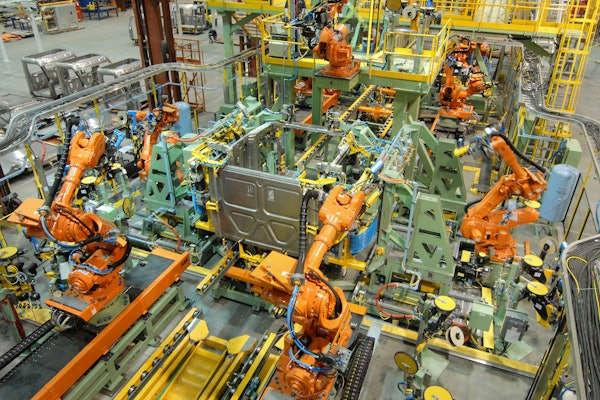By Randy Grider
At about 12:50 CT Saturday morning, Sept. 8, the first Mexico-domiciled truck authorized under the Bush administration’s pilot program to transport cargo within the United States cleared federal inspections at the U.S. border in Laredo, Texas, bound for North Carolina.
In light of the special occasion, border inspectors had moved the late-model Freightliner owned by Transportes Olympic of Nuevo Leon, Mexico, to the front of the line for an extensive inspection.
After more than two hours of inspections, driver Luis Gonzales was heading north on Interstate 35 and was expected within 30 minutes to cross the 25-mile commercial zone that has been the boundary for Mexican trucks since the United States closed its border to its southern neighbors in 1982.
Despite scattered protests from some American trucking and labor organizations since the Federal Motor Carrier Safety Administration gave the green light to the pilot program Thursday, Sept. 6, the truck crossed without incident, reports Jorge Arboleda, editor of Tuscaloosa, Ala.-based Transportista magazine. (Transportista is owned by Randall-Reilly Publishing, which also publishes CCJ, Overdrive, Truckers News and other trucking publications). Arboleda rode along with Gonzales as he left Monterrey, Mexico, on Friday, Sept. 7, at about 6 p.m. CT.
Fernando Paez was both excited and a little nervous as one of his drivers was to become the first to cross the border under the Federal Motor Carrier Safety Administration’s pilot program. Paez, 40, is owner of Transportes Olympic — the first Mexican carrier authorized to operate in the United States beyond the so-called commercial zone as part of the program.
“We’re only taking one truck just in case the Teamsters burn one of them,” Paez says jokingly. “Hopefully, we won’t have any trouble.”
Meanwhile, the Mexican government approved El Paso, Texas-based Stagecoach Cartage and Distribution as the first U.S. trucking company to operate in Mexico.
Responding to critics of the cross-border plan who say Mexican trucks are unsafe, Paez believes his country’s trucking industry is being painted with a broad brush. He started his trucking business 17 years ago, following American standards and rules, including his hiring practices — which include creating individual files for all of his employees, and carrying out drug tests and safety training sessions. He also teaches drivers English, which he speaks fluently.
Transportes Olympic operates 45 trucks, all of them late-model Freightliners built in the United States under U.S. environmental and safety standards. Paez bought his first semi-trailer — a 1985 Freightliner cabover — in 1990 in San Antonio when the Mexican government allowed carriers to “nationalize” imported used trucks for a short time. He has records of each truck’s maintenance, identified with its VIN number.
Paez is proud that his company was the first chosen. “I have spent years preparing my company for this moment,” he says.









